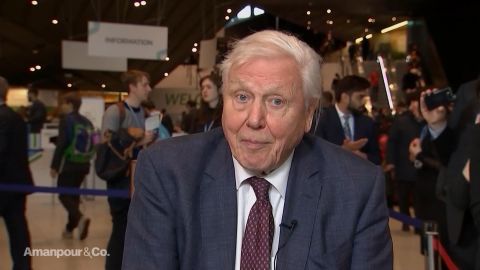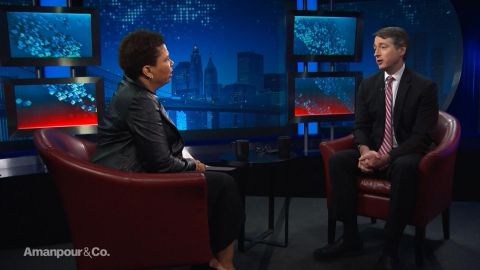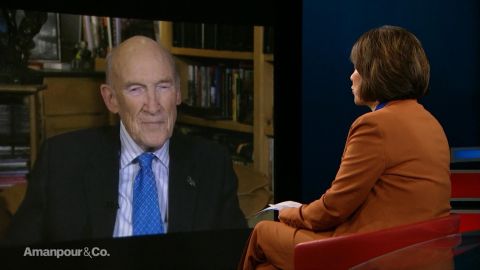Read Transcript EXPAND
ATTENBOROUGH: I think that the condition of the earth is facing has never been visible to a large proportion of the world’s population. And it’s the responsibility of people who do the sort of work that I do to make sure that what is happening is visible to people. And mind you, they know. But is also visible to the people who have their fingers on power, both political power and fiscal power, monetary power, to do something about this situation. Which is — every day that passes, it gets more and more serious.
AMANPOUR: So about 18 years ago in State of the Earth, you said the future of life on earth depends on our ability to take action. Many individuals are doing what they can but real success can only come if there’s a change in societies and our economics and in our politics. So is that kind of the purpose of your storytelling, and do you feel that some of these people in positions of power are — are — are persuadable, particularly those who are deniers and who believe that it’s economically unfeasible?
ATTENBOROUGH: We don’t have the choice to — they can’t reckon that it’s unfeasible. That’s the — that’s the — the — the voice of doom if they said that. Of course it’s — action is — is feasible. We have to do something about it. I — I didn’t start by — I was unaware when I started making natural history films that there was going to be a disaster facing us just over the horizon. I didn’t know that that was going to happen. And the motion — motive that I had in making Natural World is because I think the natural world is marvelous and wonderful and one of the great solaces of the human beings that we are part of this sort of thing. And that’s the sort of thing television should be dealing with. That’s why I started in it. But what you realize now is that if you don’t speak up, nobody will. I’ve had unprecedented fortune in being able to travel around the world and seeing all the most wonderful things. And what sort of a person would I be if I failed to speak up on this occasion when we suddenly see what the — what — what is facing us just over the horizon.
AMANPOUR: You know, you’ve also said the alarmism over climate change, some of the sort of doom and gloom that is this sort of narrative that’s out there — I guess in good faith because people want to try to get everybody’s attention and shake them by the lapels. But you think that sort of negativism and alarmism can have a — can have the wrong effect.
ATTENBOROUGH: No, I don’t. Properly handled. I think that if — if all you said was that the — in natural history programs on television is that the world is doomed, then an awful lot of people who are not in touch with the — with the natural world in the — in the — having the good fortune that you and I have, which is (ph) being able to travel in it
About This Episode EXPAND
Christiane Amanpour speaks with former Senator Alan Simpson on his friendship with George H. W. Bush and with Sir David Attenborough about the fight against climate change. Michel Martin speaks with Rich Lowry, Editor of news magazine “National Review,” about the future of the Republican Party.
LEARN MORE


